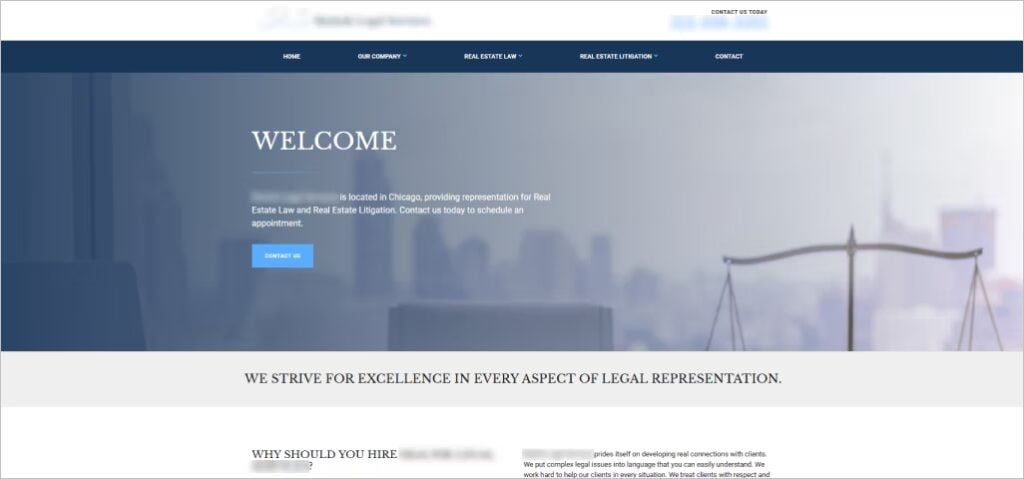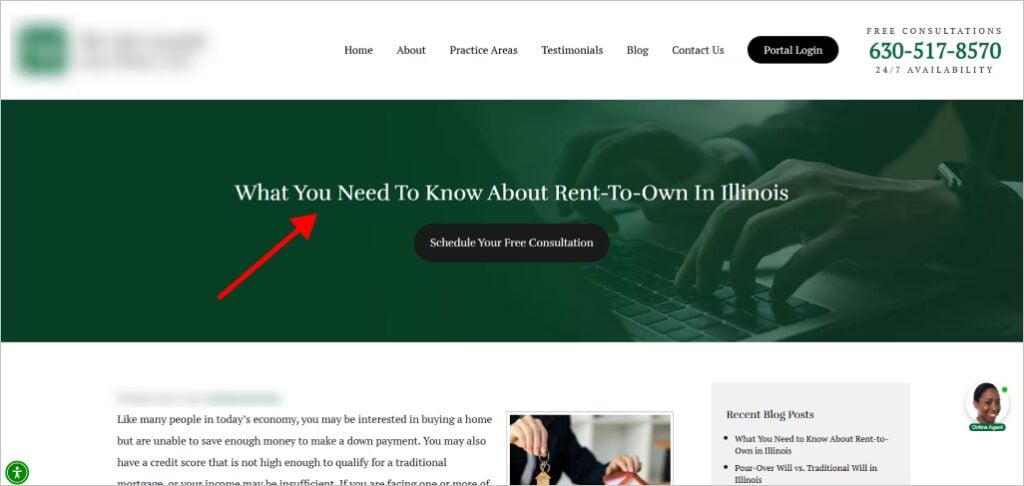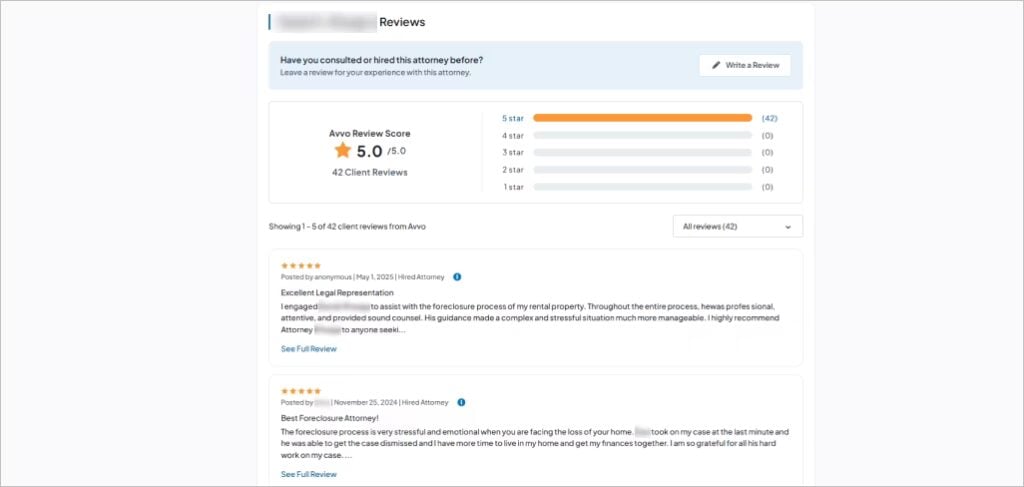Your expertise in real estate law is your greatest asset—but in today’s digital-first world, it’s not enough. Clients aren’t just looking for legal knowledge; they’re searching for speed, clarity, and convenience—and they’re doing it online.
Whether you’re helping clients close on a dream home or navigate a commercial property dispute, your ideal client is starting their search on Google. And if your law firm isn’t showing up, engaging them, and building trust from the first click, they’re hiring someone else.
The legal landscape in 2025 is more competitive than ever. Real estate attorneys who want to grow their practice need more than referrals and a decent website—they need a smart, strategic approach to digital marketing that meets modern client expectations and puts them ahead of the competition.
In this guide, we’ll explore 8 powerful marketing strategies tailored for real estate attorneys. Each tactic is built to help you get found online, convert more leads, and build a pipeline of high-quality clients who see your value before they ever step foot in your office.
Let’s get started.

Real Estate Laws Have Evolved – How Is Your Marketing Adapting?
Picture this: A property developer in your city runs into a surprise zoning issue on a multi-million dollar project. They grab their phone and type in “real estate attorney zoning disputes [your city].”
But your firm doesn’t show up. Your competitor does. Just like that, a major client—and a big opportunity—slips through your fingers before you even knew they were looking.
Why Digital Marketing Is Critical for Real Estate Attorneys in 2025
The numbers tell a compelling story:
- 89% of real estate clients research attorneys online before making contact
- 67% of all legal searches have local intent
- 72% of clients contact only attorneys appearing on the first page of search results
If your firm isn’t digitally visible, you’re essentially invisible to the vast majority of potential clients.
It’s Not Just About Being Found – It’s About Building Trust
Effective digital marketing for real estate attorneys accomplishes several critical goals:
- Positions you as the go-to expert when clients face complex property transactions or disputes
- Builds credibility through authoritative content and positive reviews
- Creates a consistent lead pipeline without relying solely on referrals
- Helps you target specific types of real estate law clients (residential, commercial, development)
AI Is Redefining Legal Marketing — Here’s What You Need to Know
The way potential clients search for legal help has evolved—dramatically. With the rise of AI-generated summaries on Google, voice assistants, and tools like ChatGPT, people are discovering and evaluating attorneys in entirely new ways.

These AI-driven systems don’t just serve up results—they choose which firms to highlight based on factors like content quality, user engagement, and digital authority. If your marketing strategy isn’t built with AI in mind, your firm could be practically invisible online—even if you’re the best real estate attorney in the area.
This Guide Is Your Competitive Edge
We’re about to show you what actually works for real estate attorneys in 2025 – from building a professional website that converts to advanced retargeting strategies that recapture interested visitors. These aren’t generic marketing tips; they’re battle-tested tactics specifically designed for real estate legal practices.
1. Build a Professional Website That Engages Visitors
Your lawyer website isn’t just a digital business card—it’s your most powerful marketing asset and often the first impression potential clients have of your practice. For real estate attorneys, a professional website must strike the perfect balance between authoritative expertise and approachable service.
Prioritize User Experience for Maximum Conversion
Today’s clients expect websites that load quickly, navigate intuitively, and display properly across all devices. In fact, 53% of visitors will abandon a website that takes more than 3 seconds to load, and mobile optimization is non-negotiable with 60% of legal service searches now happening on smartphones.
Key elements of a high-converting real estate attorney website include:
- Clear, compelling headlines that immediately communicate your real estate law specialties
- Professional photography of your team and office (avoid generic stock photos)
- Prominent contact information visible on every page
- Strategically placed call-to-action buttons (“Schedule Consultation,” “Free Case Evaluation”)
- Client testimonials highlighting successful real estate transactions or disputes
- Simplified contact forms that request only essential information
Create Practice Area Pages That Convert
Most law firm websites settle for vague, one-size-fits-all service descriptions—and that’s exactly why they don’t convert. If you really want to connect with potential clients, every area of your real estate law practice needs its own page that speaks directly to their concerns.
Whether someone’s buying their first home, navigating a commercial property deal, facing a landlord dispute, or trying to make sense of zoning laws, they’re looking for answers—fast. Show them you get it. Use clear language, walk them through how you help, share real case examples, and include FAQs that feel like they were written just for them.
The goal isn’t just to inform—it’s to build trust. When people feel like you understand their problem, they’re far more likely to believe you can solve it.
Implement Trust Signals Throughout Your Site
Real estate transactions involve significant financial stakes, making trust signals particularly important:
- Bar association memberships
- Real estate industry affiliations
- Awards and recognitions
- Education credentials
- Years of experience in real estate law
- Case results (with appropriate disclaimers)

AI Tip: Use a conversational AI chatbot specifically programmed with real estate law FAQs to engage visitors immediately, capture contact information, and pre-qualify leads even outside office hours.
2. Search Engine Optimization (SEO)
In a market where visibility equals opportunity, law firm SEO is the foundation of your digital marketing strategy. For real estate attorneys, effective SEO isn’t just about ranking—it’s about attracting the right clients at the exact moment they need your services.
Local SEO: Your Competitive Advantage
Real estate law is inherently local, making local SEO particularly valuable. When someone searches “real estate lawyer near me” or “property attorney in [your city],” your practice should appear in the top results.
To dominate local search:
- Optimize your Google Business Profile with accurate business information, photos, and regular posts about real estate law topics
- Build citations on legal directories and local business listings with consistent NAP (name, address, phone) information
- Collect and respond to reviews from satisfied real estate clients
- Create location-specific pages for each market you serve
Law firm local SEO delivers exceptional ROI because it targets high-intent prospects in your specific geographic area—the exact people searching for real estate legal services near them.
Content Optimization for Real Estate Legal Searches
When people look for real estate legal help, they’re not just typing in “lawyer near me.” They’re asking specific, urgent questions like “real estate closing attorney fees” or “how to challenge property tax assessment?”
This is where your firm can shine. By creating helpful, well-written content that answers these exact questions, you’re not just improving your search rankings—you’re building trust before a client even picks up the phone.
Make sure these search terms are woven naturally into your page titles, headings, meta descriptions, URLs, and even your image alt text. Think of it as setting up signposts across the internet that all point directly to you. The more relevant your content, the more likely the right clients are to find you—and choose you.
Technical SEO: The Foundation of Visibility
Even brilliant content won’t perform without solid technical SEO fundamentals:
- Page speed optimization (critical for both user experience and rankings)
- Mobile-friendly design (Google predominantly uses mobile versions for indexing)
- Secure site (HTTPS) (especially important for law firms handling sensitive information)
- Schema markup (using Attorney and LocalBusiness schemas to enhance search visibility)
- Clean site architecture with logical navigation
Remember: SEO isn’t a one-time project but an ongoing process requiring regular audits, updates, and refinements as search algorithms and client needs evolve.
3. Develop Engaging and Valuable Content
Legal content marketing isn’t just about blogging—it’s about establishing your authority in real estate law while answering the exact questions your potential clients are asking. Strategic content positions you as the go-to resource before prospects are even ready to hire.
Create Content That Addresses Real Client Questions
The most effective content marketing strategy starts with understanding what your real estate clients want to know:
- “What disclosures are required when selling property with defects?”
- “How to legally structure a rent-to-own agreement”
- “Commercial lease negotiation tips for small businesses”
- “Understanding easements and property rights”
- “How to resolve boundary disputes with neighbors”

By answering these questions comprehensively, you demonstrate expertise while capturing organic search traffic from prospective clients.
Develop a Content Calendar Around Real Estate Seasons
Real estate markets follow predictable patterns. Align your content calendar with these cycles:
- Spring (buying season): Content about closings, title searches, and purchase agreements
- Summer (construction season): Articles on contractor disputes, permit issues, and zoning
- Fall (investment season): Resources on property investment structures and tax considerations
- Winter (planning season): Content about estate planning aspects of real property
This approach ensures your content remains relevant to what clients are actively concerned about throughout the year.
Content Formats for Maximum Impact
If you’re a real estate attorney, your expertise deserves to stand out—and effective legal copywriting can make that happen. By diversifying your content strategy, you’ll capture attention and build lasting trust with potential clients.
A thoughtful blog post can educate, a downloadable resource like a “Homebuyer’s Legal Checklist” can generate leads, and a short, engaging video gives people a glimpse of who you are beyond the courtroom. Want to break down complex legal topics? Infographics and webinars are great ways to make things clearer and more approachable.
What resonates? Practical, easy-to-follow guides for real estate transactions, helpful checklists for buyers and sellers, and local market insights that highlight the legal side of things. Even simple tools like comparison charts—say, choosing between an LLC or a trust for property ownership—can go a long way in helping your audience make informed decisions.
And remember, it’s not about how much you post, but how valuable your content is. One well-crafted, insightful article each month can do far more for your credibility and visibility than a flood of generic posts. Quality always wins.
4. Launch a High-Impact Pay-Per-Click Campaign
While SEO builds long-term visibility, pay-per-click (PPC) advertising delivers immediate visibility for your real estate law practice. When executed strategically, law firm PPC campaigns can generate qualified leads while you’re building your organic presence.
Target High-Intent Keywords with Commercial Value
Focus your marketing budget on search terms indicating immediate need:
- “Real estate attorney near me”
- “Lawyer for failed home inspection”
- “Commercial lease review attorney [your city]”
- “Real estate closing lawyer [specific neighborhood]”
Avoid broad terms like “real estate law” or “property lawyer” – they’re expensive and often attract researchers rather than ready-to-hire clients.
Create Landing Pages Specific to Each Campaign
Generic service descriptions won’t cut it. Each real estate law subspecialty deserves its own dedicated page that addresses specific client pain points:
- Residential real estate transactions
- Commercial property deals
- Landlord-tenant disputes
- Zoning and land use regulations
- Property title issues
- Real estate litigation
Each page should include relevant case studies, FAQs specific to that practice area, and clear explanations of how you help clients navigate complex real estate legal matters.
Use Ad Extensions to Stand Out
Want your ads to grab attention and get more clicks? Use ad extensions to give people more reasons to choose you. Show your office location so they know you’re nearby, add a tap-to-call button for instant contact, and guide them to the services that matter most. It’s a simple way to make your ads more useful—and way more effective.
Implement Conversion Tracking and Optimization
PPC isn’t just about getting clicks—it’s about turning those clicks into real results. That starts with setting up proper tracking so you know when someone calls or fills out a form. From there, you can test different ad messages to see what actually resonates, try out new landing page designs, and fine-tune your targeting to reach the right people. With each tweak, you’re not guessing—you’re making smarter decisions that lead to better ROI.
Pro Tip: Set up call tracking numbers to understand which keywords and ads drive phone inquiries—often the highest-value conversions for real estate attorneys.
5. Utilize Social Media Marketing to Drive User Interaction
Social media marketing for lawyers isn’t just about posting — it’s about connecting. By choosing the right channels and sharing valuable insights into property law, you make your practice more relatable and trustworthy to potential clients.
Choose Platforms Strategically
Not all social media platforms yield equal results for real estate attorneys:
- LinkedIn: Ideal for B2B connections (commercial real estate, developers, investors)
- Facebook: Effective for reaching residential clients and community engagement
- Instagram: Visual showcase of your team, office, and community involvement
- X (Twitter): Useful for commentary on real estate news and regulatory changes

Rather than diluting efforts across all platforms, focus on mastering 1-2 channels where your ideal clients spend time.
Content That Engages Real Estate Clients
If you want real estate clients to really pay attention, your content needs to feel both helpful and relatable. Share recent wins (while keeping details private), chat about what’s happening in the local market, and explain new rules that affect property owners in simple terms.
Throw in real client stories and behind-the-scenes moments from your practice to show there’s a real person behind the law. The key? Make most of what you share—around 80%—about giving useful info, and save the rest for telling people what you offer. This way, you build trust and keep people coming back for more.
Build Strategic Relationships
Social platforms excel at facilitating professional connections:
- Engage with real estate agents, brokers, and property managers
- Participate in conversations with mortgage lenders and title companies
- Connect with local business organizations and chambers of commerce
- Join and contribute to real estate investment groups
These relationships often generate referrals from complementary professionals who encounter clients needing real estate legal services.
Consistency and Automation
Maintain a consistent posting schedule using scheduling tools like Hootsuite, Buffer, or SocialPilot. Even 2-3 quality posts per week on your primary platform can build momentum and engagement over time.
6. Manage and Enhance Your Online Reputation
For real estate attorneys, reputation is everything. Today’s clients extensively research attorneys online before making contact, making attorney reputation management a critical component of your digital marketing strategy.
Monitor and Respond to Reviews
More than ever, clients rely on attorney review sites as their go-to source for evaluating and selecting the right legal professional:
- Google Business Profile: Often the first place clients leave feedback
- Avvo: Legal-specific reviews with significant visibility
- Facebook: Social proof that influences potential clients
- Yelp: Still relevant for local service providers

Establish a system to:
- Monitor all platforms for new reviews
- Respond promptly to all feedback (positive and negative)
- Address legitimate concerns professionally
- Thank clients for positive feedback
Remember that your response to negative reviews often matters more than the review itself, demonstrating your professionalism and commitment to client satisfaction.
Proactively Generate Positive Reviews
Don’t leave your online reputation up to chance—take charge and make sure your successes shine! After each case, make it easy for clients to leave their feedback. A quick follow-up email with direct links to your review platforms can go a long way.
If you really want to streamline things, consider using reputation management software to automate the process and save time. Train your team to recognize happy clients who would love to share their positive experiences. And most importantly—timing is everything! Reach out when the positive results are still fresh in their minds, so they’re more likely to leave that glowing review.
Showcase Testimonials Strategically
Beyond third-party platforms, leverage positive feedback across your marketing assets:
- Feature testimonials on practice area pages that match the client’s issue
- Create case study narratives around successful real estate outcomes
- Include video testimonials for maximum impact
- Highlight reviews from different client types (homeowners, investors, businesses)
AI Tip: Use sentiment analysis tools to identify common themes in positive reviews and emphasize these aspects in your marketing materials.
7. Implement Retargeting to Recapture Interested Visitors
Only 2-3% of website visitors convert during their first visit. Retargeting keeps your firm visible to the other 97-98% as they continue their decision-making process, dramatically increasing your chances of securing their business.
Set Up Strategic Audience Segments
Not all website visitors have the same intent. Create custom audience segments for more effective retargeting:
- Service page visitors: People who viewed specific real estate practice areas
- Blog readers: Those consuming educational content but not yet ready to hire
- High-intent visitors: Users who viewed contact pages or pricing information but didn’t convert
- Past clients: Previous clients who might need additional services
Tailoring your messaging to each segment’s specific stage in the client journey significantly improves conversion rates.
Create Ad Creative That Advances the Relationship
Effective retargeting doesn’t just repeat your initial message—it addresses objections and moves prospects closer to hiring:
- Highlight specific expertise related to the pages they viewed
- Address common concerns (“Still deciding on a real estate attorney? Here’s what sets us apart…”)
- Offer valuable content related to their interests
- Showcase testimonials from similar clients
Use frequency caps to prevent ad fatigue, typically limiting impressions to 3-4 per day per user.
Deploy Multi-Channel Retargeting
Don’t limit retargeting to a single platform:
- Google Display Network: Reaches users across millions of websites
- Facebook/Instagram: Visual reminders as prospects browse social media
- YouTube: Video remarketing for maximum engagement
- Email retargeting: For visitors who provided contact information
A multi-channel approach creates a “surround sound” effect that keeps your firm top-of-mind throughout the decision process.
Measure and Optimize Performance
Track view-through conversions in addition to click-through conversions to accurately measure retargeting effectiveness. Many clients will see your ads but return directly to your site later rather than clicking the ad itself.
8. Leverage Referrals to Expand Your Customer Base
While digital marketing is crucial, referrals consistently generate the highest-quality leads for real estate attorneys. A well-executed lawyer referral marketing strategy helps transform passive word-of-mouth into a reliable, scalable source of new clients.
Develop a Structured Referral Program
Referrals should feel like a natural extension of your relationship with clients. Start by introducing your referral program right when they first come onboard—set the stage early. Then, make it a habit to ask for referrals at key moments, like when you hit a milestone or achieve a great result together.
Keep it easy for them with simple shareable links, ready-to-go email templates, or even a digital business card. And always, always show genuine appreciation for every referral they send your way—whether it leads to a new client or not. The best referral programs aren’t random; they’re part of the ongoing experience you create with your clients.
Cultivate Professional Referral Networks
Some of your best referral sources will be complementary professionals:
- Real estate agents and brokers
- Mortgage lenders and title companies
- Financial advisors and accountants
- Property managers and developers
- Other attorneys who don’t practice real estate law
Build these relationships through:
- Educational lunch-and-learns about real estate legal issues
- Co-hosted webinars on relevant topics
- Shared resources and cross-referrals
- Participation in real estate industry events
Providing value to potential referral sources before expecting referrals builds stronger, more productive relationships.
Leverage Digital Tools to Amplify Referrals
Imagine turning your referral efforts into a smooth, reliable machine — all thanks to the right technology. Referral management software helps you stay on top of every lead, so no connection gets lost. Automated emails keep the conversation going without you having to lift a finger.
Digital referral cards with trackable links make sharing simple and measurable, while personalized landing pages give each referral source a unique, thoughtful touch. Together, these tools take the guesswork out of referrals, making the whole process easier, more consistent, and way more effective.
Incentivize Thoughtfully and Ethically
When it comes to showing appreciation, it’s important to be both thoughtful and ethical. Make sure you follow your state’s guidelines, but don’t let that stop you from genuinely thanking those who support you. Whether it’s by making a charitable donation in their name, collaborating on a marketing project, or giving them a special spotlight in your newsletter, the key is to keep it heartfelt and professional. After all, sincere gratitude goes a long way in building trust and meaningful relationships that last.
Putting It All Together: Your Digital Marketing Action Plan
Implementing these strategies requires a coordinated approach. Here’s a suggested 90-day action plan to jumpstart your real estate law firm’s digital marketing:
Days 1-30: Foundation Building
The first 30 days focus on establishing a strong digital marketing foundation by optimizing your website, setting up analytics, and building your local presence. This phase sets the stage for all future efforts. Key tasks for this stage include:
- Complete a comprehensive website audit and optimization
- Set up proper analytics and conversion tracking
- Claim and optimize your Google Business Profile
- Develop your initial content calendar focused on high-value real estate topics
- Identify your top 5 priority keywords for both organic and paid strategies
Days 31-60: Content Creation and Distribution
With the foundation in place, the next 30 days are dedicated to creating valuable content and distributing it effectively. This phase also starts outreach and review-building efforts. Focus areas for this phase are:
- Produce 3-5 cornerstone content pieces for your key practice areas
- Launch your initial social media strategy on your primary platform
- Begin outreach for strategic backlinks from relevant legal and real estate resources
- Implement a systematic review generation process
- Set up your first retargeting campaign
Days 61-90: Optimization and Scaling
In the final phase, use data to optimize and scale your law firm marketing efforts, expand content, refine targeting, and build referral programs. The main goals for this stage include:
- Launch targeted PPC campaigns for high-intent keywords
- Expand your content strategy based on initial performance data
- Refine audience targeting based on visitor behavior
- Implement a formal referral program
- Develop a measurement dashboard to track all marketing channels
Conclusion: Digital Marketing Is Your Competitive Advantage
In today’s competitive legal market, being a great real estate attorney isn’t enough—you also need to stand out online. The most successful law firms don’t just practice law; they know how to showcase their value through smart, strategic digital marketing.
By applying these eight proven strategies, your real estate law firm can attract higher-quality clients, grow sustainably, and build a strong reputation as the go-to expert in your area.
The digital world keeps changing, but one thing stays the same: your clients are searching for help online. Be visible. Be valuable. Do that consistently, and your firm will rise above the competition.
Want to take your marketing to the next level? At Comrade Digital Marketing, we specialize in helping real estate law firms grow. Get in touch for a free digital strategy assessment—we’ll review your online presence and show you the biggest opportunities to grow your practice.
Frequently Asked Questions
-
Should real estate attorneys consider outsourcing their marketing to an agency?
Yes, outsourcing marketing services to an experienced agency can save time and ensure professional strategies are in place to attract clients effectively. Agencies bring specialized knowledge of the legal industry and can help attorneys focus on practicing law while marketing experts handle promotion. This partnership often results in a more strategic and consistent effort to reach the target audience.
-
What is the typical timeline for marketing to generate results in the real estate legal field?
In the real estate legal field, marketing efforts typically start showing measurable results within 3 to 6 months, depending on the strategy used. Tactics like Google Ads may yield quicker outcomes, while organic growth through content and SEO takes longer. A strong online presence must be built and nurtured consistently to climb search engine results pages and gain long-term traction.
-
Which marketing missteps commonly hinder success for real estate law firms?
One major misstep is failing to use relevant keywords that connect with how prospective clients search for legal help. Others include neglecting to attract potential clients through clear messaging or not tailoring content to the legal profession. Additionally, inconsistent branding or weak website optimization can make it difficult to reach more clients and stand out in a crowded market.
